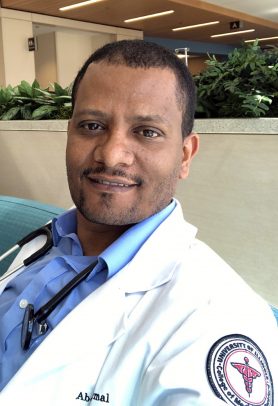Inspiring grads: Physician inspired by challenges faced growing up in Ethiopia

Abdusebur Jemal decided he would become a doctor as a young boy, after experiencing the challenges faced by poor populations in Ethiopia.
“I saw women die while giving birth,” said Jemal, now a medical student at the Rockford campus. He remembered his childhood in a small village in Ethiopia’s East Hararghe Zone called Harew, which had no access to antibiotics or even basic electricity.
“I saw my younger brother succumb to tuberculosis meningitis, but the nearest clinic was days away in a place where cars are a rarity,” he said.
Other societal woes inspired more traumatic events. Jemal witnessed his friends join rebellions to overthrow a brutal government, for example. Many of those friends died.
When he came to the U.S. as a refugee at 14, he put his dream of helping others to practice. It started with research in high school.
“My first project involved giving alcoholic drinks to mice,” he said.
When one mouse drank alcohol but broke out of its cage, Jemal was confused because, as a depressant, alcohol consumption usually slows physical activity.
“Nonetheless, the idea of posing a question and being challenged constantly was what drew me to research,” he said.
That interest would lead him to study overseas at the University of Oxford and earn degrees at Stanford and then Yale, where he obtained a master’s in public health. Later, he worked with world-renowned cancer doctor Brian Druker, creator of the breakthrough pill known as Gleevec. The revolutionary treatment was the first its kind, helping patients with chronic myelogenous leukemia — an uncommon type of cancer of the blood cells — survive the fatal disease and live longer with treatment.
“Here, I had the chance to work on great ideas in medicine and medical research; is it possible to eradicate cancer? And Dr. Druker and his lab are in a race to answer that question,” said Jemal.
In 2015, he joined the University of Illinois College of Medicine at Rockford.
“I had no connection to the college and applied after I found that they like students from diverse backgrounds,” he said. “It ended up being one of the few schools in the country that believed in me, and I am really grateful for the opportunity.”
As
he gets ready to cross the stage this May, he can point to more ways he’s
realizing his childhood dream of helping others: Eight published articles,
including abstracts and a full paper. Collaborations with other cancer
researchers that he’ll continue to pursue. A residency placement at the Oregon
Health and Science University in Portland, Oregon, where he’ll pursue emergency
medicine training. Ties to a university system dedicated to the success of its
diverse student body.
“The Rockford campus is full of people with great heart and mind,” said Jemal, who recounted his wife and daughter’s grueling visa application process and how they were affected when Trump enacted a travel ban on individuals from seven Muslim-majority countries. The university helped Jemal get legal advice.
“For someone who has been moving from place to place like a nomad, all I want from people is to treat me like family. I found that here at UIC COM Rockford,” Jemal said. “I will forever be grateful and take the great memories with me. I hope to one day come back and support UIC and carry out its mission of being a world-class institution that changes life for the betterment of humanity.”
